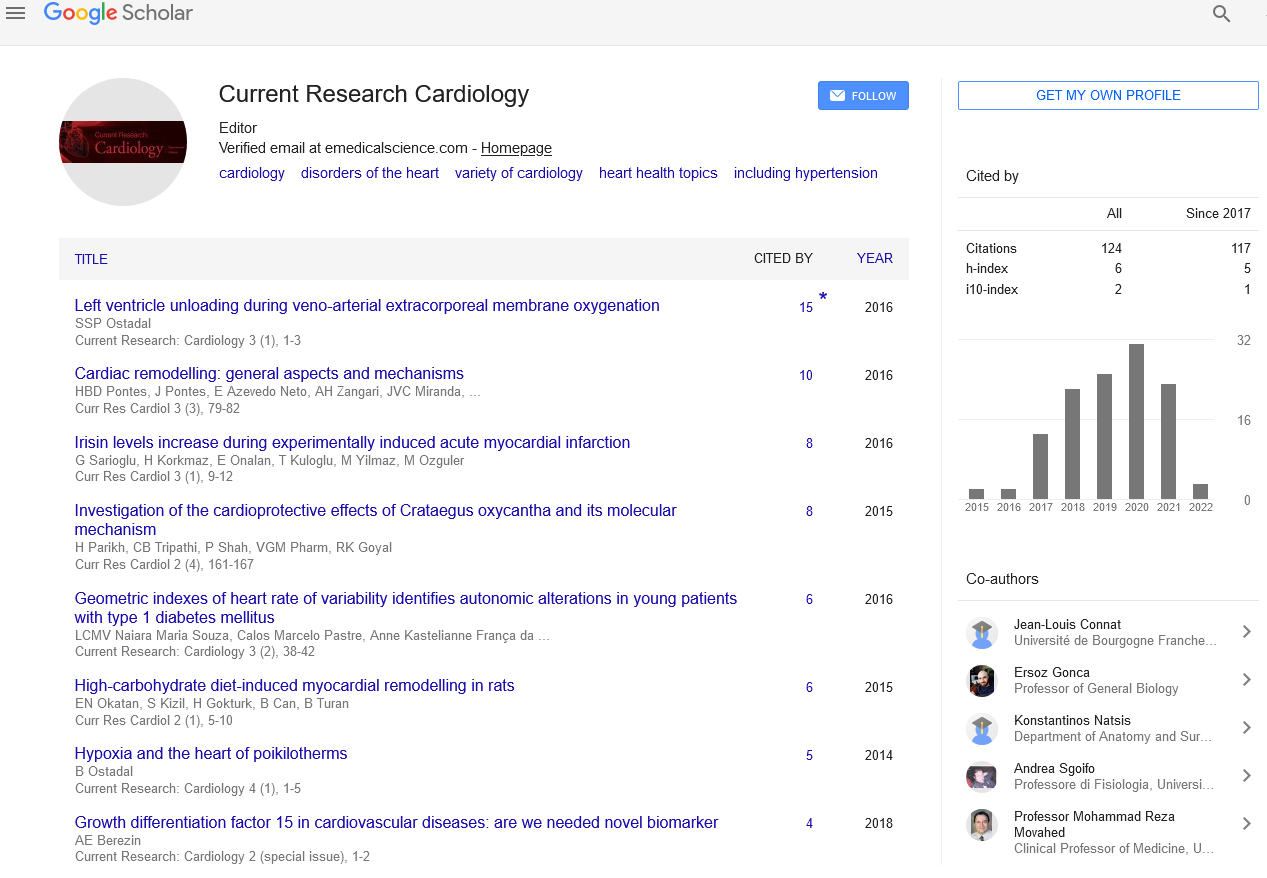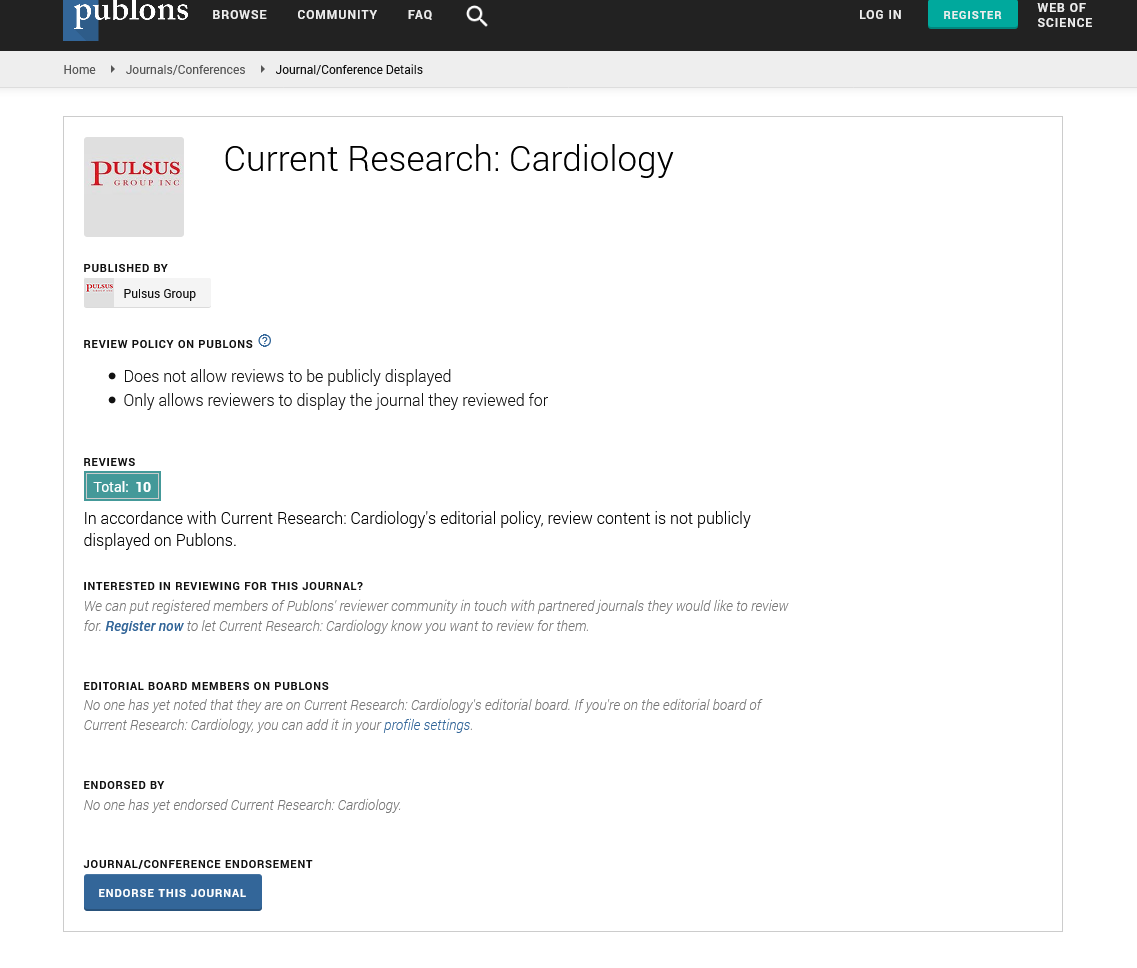What is interventional cardiology?
Received: 02-Nov-2021 Accepted Date: Nov 16, 2021; Published: 23-Nov-2021
Citation: S Santoshi. What is interventional cardiology? Curr Res Cardiol . 2021;8(4):2.
This open-access article is distributed under the terms of the Creative Commons Attribution Non-Commercial License (CC BY-NC) (http://creativecommons.org/licenses/by-nc/4.0/), which permits reuse, distribution and reproduction of the article, provided that the original work is properly cited and the reuse is restricted to noncommercial purposes. For commercial reuse, contact reprints@pulsus.com
Description
Cardiology is a branch of internal medicine and medical specialty which is concerned with disorders of the heart and it deals with the diagnosis and treatment of such conditions as congenital heart defects, coronary artery disease, electrophysiology, heart failure and valvular heart disease. Cardiac electrophysiology, echocardiography, interventional cardiology and nuclear cardiology are included in the subspecialties of the cardiology field. There are a range of cardiovascular disorders which are being studied in this field. Acute coronary syndrome which encompasses broad range of myocardial infarction symptoms, angina pectoris, atherosclerosis, coronary heart disease and restenosis are other common disorders. Cardiac arrest; disorders of the myocardium, or the muscle of the heart, which include varieties of cardiomyopathy; disorders of the pericardium, or the outer lining of the heart, which include types of pericarditis; disorders of the heart valves, including the aortic valve, the mitral valve, the pulmonary valve and the tricuspid valve; congenital heart defects, which range from atrial septal defect to ventricular septal defect; diseases of the blood vessels, or vascular diseases, which includes aneurysm, deep vein thrombosis, varicose veins, vasculitis and diseases of other blood vessels are included in broader categories of disorders in the field of cardiology. Interventional cardiology is the subspecialty of cardiology that utilizes the specific catheter-based methods to diagnose as well as to treat coronary artery disease, vascular illness, congenital heart defects and underlying coronary illness. Interventional cardiologists use different types of diagnostic devices or tools and imaging methods to measure cardiovascular functions, such as, blood pressure and blood flow in major arteries all through the body and inside the various chambers of the heart. These cardiologists don't perform traditional "open" heart medical procedures. The key difference between interventional cardiology and general cardiology is that interventional cardiologists are trained to perform specific catheter-based treatments for cardiopathy, whereas general cardiologists don't seem to be trained in those procedures. General cardiologists concentrate on the diagnosis and care of patients with conditions such as hypertension, high cholesterol, and elevated risk of heart failure or stroke. They conduct many types of tests and procedures associated with cardiovascular concerns-heart-rhythm disorders, as an example-but they do not perform traditional “open” surgeries or endoscopic procedures. General cardiologists may follow up on subspecialist care and see patients long-term for cardiovascular concerns. Interventional cardiologists are cardiology subspecialists who are trained to place stents in clogged arteries to permit blood to flow properly and reduce risk of stroke or heart attack, as well as to repair holes within the heart or place special devices within the heart to assist it function properly. Using cutting-edge technology and the newest techniques and complex advancements during this field of medicine-like cardiac catheterization, Transcatheter Aortic Valve Replacement (TAVR), and mitral valve replacement and repairs- they perform life-saving and life-enhancing procedures to treat patients with valve defects, cardiovascular disease, or structural abnormalities. Interventional cardiologists usually seem to be a one-time or occasional care provider, when their specific expertise is required for a specific procedure. Cardiac surgeons perform traditional “open” surgeries, like coronary artery bypass surgery. Patients who see general cardiologists and interventional cardiologists could also be said a cardiac surgeon if their heart condition can’t be treated with medication or a less invasive catheter-based procedure. Neither general cardiologists nor interventional cardiologists perform surgery. An interventional cardiologist evaluates a patient’s medical history, educates the patient regarding heart health and ways of preventing it from complications, performs a physical examination such as evaluation of blood pressure and vitals etc., diagnoses and treats acute or chronic diseases, screen out the risk factors related to heart problems, performs procedures such as cardiac catherization, coronary angioplasty and also provides optimal patient care to the patient.






